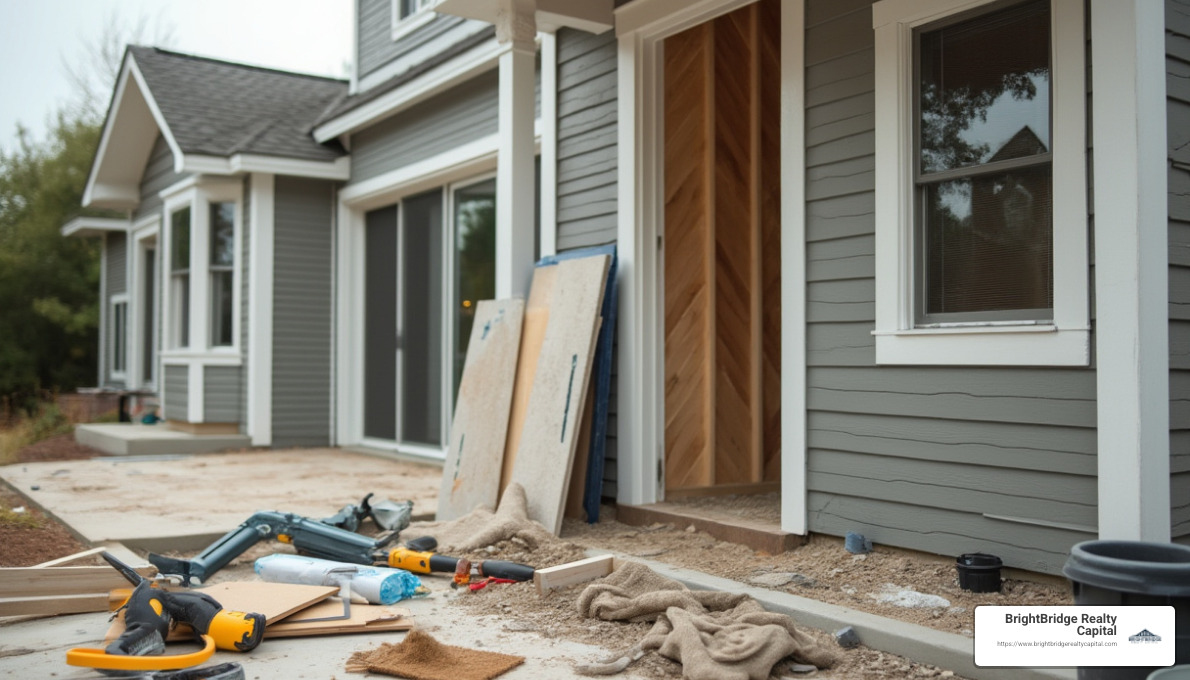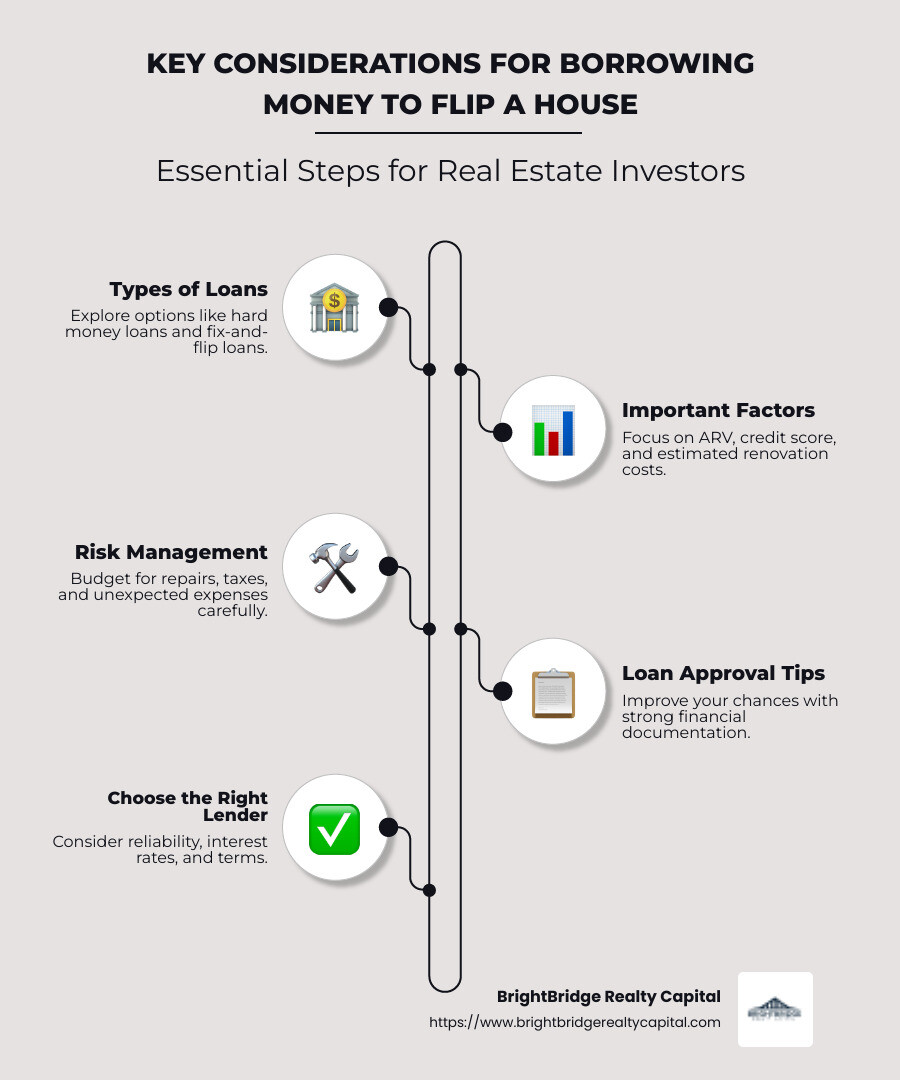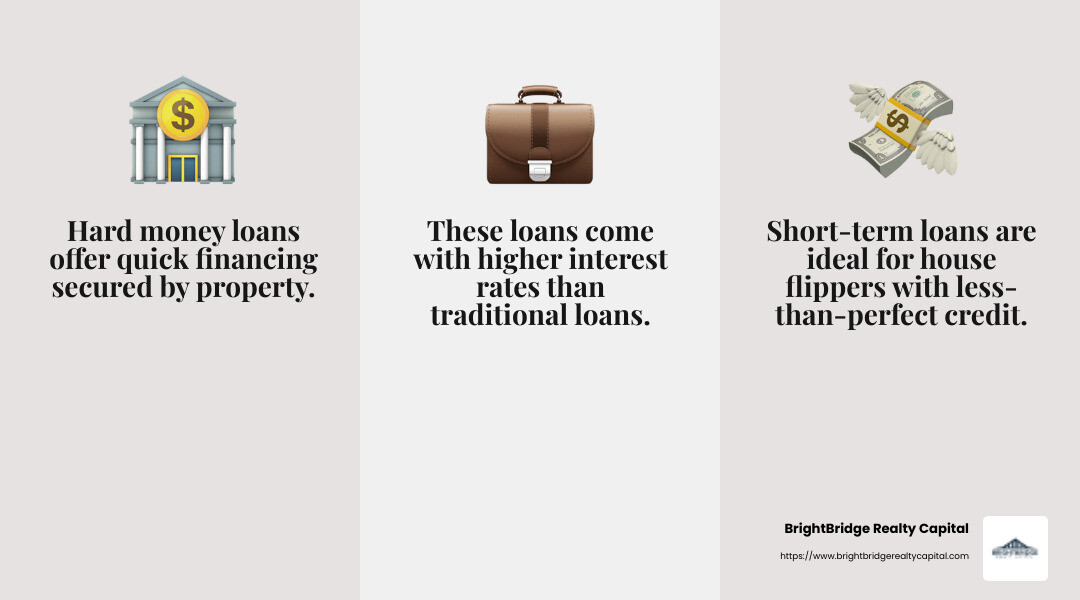The Art of Borrowing: Funding Your House Flip

Borrowing money to flip a house is an art form that can transform a worn-out property into a profitable investment. For many real estate investors, house flipping represents the perfect blend of opportunity and challenge, offering a chance to leverage borrowed capital to achieve significant returns quickly.
In the busy world of real estate investing, flipping houses is a popular strategy because it combines creativity with business acumen. By purchasing distressed properties, renovating them, and selling them at a profit, investors can enjoy the thrill of change while building substantial financial gains.
Here's a quick overview of key considerations when borrowing money to flip a house:
Types of loans: Hard money loans, fix-and-flip loans, and HELOCs.
Important factors: After-repair value (ARV), credit score, and renovation costs.
Risk management: Proper budgeting for repairs, taxes, and unexpected expenses.
By understanding these elements, real estate investors can make informed decisions and steer the dynamic landscape of house flipping with confidence.

Borrowing money to flip a house terms made easy:
Understanding House Flipping Loans
When it comes to borrowing money to flip a house, choosing the right loan is crucial. Different loan types cater to the unique needs of house flippers, each with its own set of benefits and challenges.
Loan Types and Financing Options
1. Hard Money Loans
Hard money loans are a popular choice for flippers because they offer quick access to funds. These loans are short-term and secured by the property itself, making them a viable option even if your credit score isn’t perfect. However, they come with higher interest rates and fees compared to traditional loans. This is because lenders focus more on the potential of the property than on the borrower's creditworthiness.

2. Home Equity Loans and HELOCs
If you have significant equity in your current home, a home equity loan or a home equity line of credit (HELOC) can be a smart way to finance a flip. These allow you to borrow against the value of your home, often at lower interest rates than hard money loans. A home equity loan provides a lump sum, while a HELOC offers a revolving line of credit, giving you flexibility to draw funds as needed.
These are specifically designed for house flipping. They cover the purchase price and potential renovation costs, making them ideal for quick turnarounds. The terms are usually short, aligning with the typical timeline of a flip project.
Hard Money Loans Explained
Hard money loans are particularly useful for investors who need to move fast. They can often close in as little as a week or two. These loans are typically offered by private lenders who focus on the property’s value and potential rather than the borrower's financial history.
Pros:
- Fast access to capital
- Flexible terms
Cons:
- High interest rates
- Short repayment periods
Home Equity Options
Both home equity loans and HELOCs allow you to tap into the value of your existing home. This can be a cost-effective way to fund your flip, especially if you have a significant amount of equity and a good credit score.
Home Equity Loan:
- Lump sum disbursement
- Fixed interest rates
HELOC:
- Revolving credit line
- Variable interest rates
Each type of loan has its pros and cons, and the right choice depends on your financial situation and project needs. Understanding these options helps you make informed decisions, ensuring that your house flipping venture is both profitable and sustainable.
Borrowing Money to Flip a House
Flipping houses can be a rewarding venture, but it requires the right financing. Let's explore the options available and what you need to know about borrowing money to flip a house.
Hard Money Loans Explained
Hard money loans are a popular choice for many house flippers. These are short-term loans, typically ranging from 6 to 18 months, designed to help you quickly purchase and renovate a property.
Key Features:
- Collateral: The property itself serves as collateral, which means your credit score isn't the primary concern for lenders.
- High Interest Rates: Due to the higher risk involved, interest rates can be steep. However, the quick access to funds often outweighs this downside.
- Fast Approval: These loans can be approved in a matter of days, making them ideal for competitive real estate markets.
Pros:
- Quick funding
- Less emphasis on credit history
Cons:
- Higher interest rates
- Short repayment terms
Home Equity Options
If you own a home with substantial equity, using it to fund your flip can be a strategic move. There are two main options here:
1. Home Equity Line of Credit (HELOC):
- Acts like a credit card; you can borrow as needed up to a certain limit.
- Offers flexibility, especially if renovation costs are uncertain.
- Typically comes with a variable interest rate.
2. Cash-Out Refinance:
- Replaces your existing mortgage with a new, larger loan, giving you the difference in cash.
- Fixed interest rates are common, providing predictable payments.
- Suitable if you want to leverage the equity without selling your primary residence.
Pros of Home Equity Options:
- Lower interest rates compared to hard money loans
- Potential tax benefits
Cons:
- Your home is at risk if you default
- Can increase your overall debt
By understanding these options, you can choose the best financing strategy for your house flipping project. Whether it's a hard money loan for its speed and flexibility or leveraging home equity for its cost-effectiveness, the right choice will align with your financial goals and project timelines.
Steps to Secure a House Flipping Loan
Securing a loan for flipping houses involves several crucial steps. Let's break them down to make sure you're well-prepared.
Calculating After-Repair Value (ARV)
Before you even apply for a loan, you need to know the After-Repair Value (ARV) of the property. ARV is the estimated value of the property after renovations are complete. This figure is vital for both you and the lender because it helps determine the property's potential profitability.
How to Calculate ARV:
- Research Comparable Sales: Look for recently sold homes similar to your property in size, location, and condition.
- Estimate Renovation Costs: Add the cost of repairs and upgrades to your purchase price.
- Calculate ARV: Subtract the renovation costs from the expected sale price based on comparable sales.
Knowing the ARV helps you decide if the project is worth the investment and shows lenders the potential return on their loan.
Preparing Your Application
Once you have your ARV, it's time to prepare your loan application. Here's what you need to focus on:
1. Credit Score:
- While hard money loans may not emphasize credit scores, a higher score can still improve your terms.
- Aim for a score of at least 600 to 620 for better loan options.
2. Down Payment:
- Most lenders require a down payment, often around 15% of the purchase price.
- For a more favorable loan, consider putting down 25% of the ARV.
3. Financial History:
- Lenders will want to see a history of financial responsibility. This can include proof of income and any previous real estate investments.
- Having a solid financial background reassures lenders of your ability to manage repayments.
4. Documentation:
- Gather necessary documents like tax returns, bank statements, and proof of income.
- Providing comprehensive documentation speeds up the approval process.
5. Lender Requirements:
- Each lender has different requirements, so it's crucial to understand what's needed.
- Some lenders might require previous house flipping experience, while others focus on the ARV and your financial history.
By preparing these elements carefully, you'll improve your chances of securing a loan. Borrowing money to flip a house is not just about meeting the lender's criteria but also ensuring the investment is profitable for you.
This preparation sets the stage for a successful house flip, allowing you to move confidently into the next phase of your project.
Common Expenses in a Fix-and-Flip Project
When flipping a house, understanding the costs involved is crucial. Let's explore the common expenses you should be prepared for.
Renovation and Repair Costs
Materials, Labor, and Equipment
Renovating a property can be expensive. You'll need to budget for materials like paint, flooring, and fixtures. Labor costs for contractors and specialists can also add up quickly.
- Materials: Quality materials can improve the home's value but may cost more upfront.
- Labor: Hiring skilled workers ensures quality work but comes at a price.
- Equipment: Renting or buying tools and machinery can be a hidden cost.
It's smart to keep a 20% to 30% cash reserve for unexpected expenses, like finding hidden damage during renovations.
Additional Financial Considerations
Insurance, Utilities, and Taxes
- Homeowners Insurance: This is essential to protect your investment from accidents or natural disasters. Distressed properties often require separate policies due to higher risks.
- Utilities: While renovating, you'll need to cover utility costs for water, electricity, and gas. Don't forget about sewage and trash services.
- Property Taxes: These are ongoing costs that can vary based on location and property value. Make sure to account for them in your budget.
- Capital Gains Taxes: If you sell the property for a profit, you might owe capital gains taxes. These can significantly impact your net profit.
Unexpected Costs
Flipping houses often comes with surprises. From structural issues to fluctuating material prices, unexpected costs can quickly eat into your budget. Planning for these can make or break your project.
By understanding and preparing for these expenses, you'll be better equipped to manage your project and ensure a successful flip. Next, let's explore the frequently asked questions about borrowing money to flip a house.
Frequently Asked Questions about Borrowing Money to Flip a House
When it comes to borrowing money to flip a house, there are common questions that many potential investors have. Let's address some of these key concerns.
What are the risks of using a hard money loan?
Hard money loans are popular among house flippers due to their quick approval process and flexible terms. However, they come with certain risks:
- High Interest Rates: Hard money loans typically have higher interest rates than conventional loans. This can increase the overall cost of borrowing.
- Short Repayment Periods: These loans are often short-term, usually 12 to 18 months. If you can't sell the property quickly, you might face financial strain.
- Collateral Requirements: Hard money loans are secured by the property itself. If you default, you risk losing the property.

How can I improve my chances of loan approval?
Improving your chances of getting a loan to flip a house involves several key steps:
- Boost Your Credit Score: Lenders look at your credit history to assess risk. A higher score can lead to better loan terms.
- Prepare a Solid Business Plan: Demonstrate the potential profitability of your project. Include detailed cost estimates, timelines, and the after-repair value (ARV) of the property.
- Show Financial Stability: Lenders prefer borrowers with steady income and manageable debt levels. Having a healthy cash reserve can also improve your application.
What should I consider when choosing a lender?
Choosing the right lender is crucial for a successful house flip. Here are some factors to consider:
- Experience with House Flipping: Look for lenders who have a track record of working with real estate investors. They can offer valuable insights and custom loan products.
- Loan Terms and Conditions: Compare interest rates, fees, and repayment terms. Make sure they align with your project timeline and budget.
- Reputation and Reviews: Research the lender's reputation. Speak with other investors or consult your local Real Estate Investors Association for recommendations.
By addressing these frequently asked questions, you'll be better prepared to steer the complexities of financing your house flip. Next, we will conclude our discussion by highlighting how BrightBridge Realty Capital can support your investment journey.
Conclusion
Flipping houses is an exciting venture, but it can be complex. That's why choosing the right financial partner is crucial. At BrightBridge Realty Capital, we specialize in providing fast closings and competitive rates that help you seize opportunities without delay. Our expertise in real estate financing ensures that you have the support you need at every step.
Why Choose BrightBridge Realty Capital?
Fast Closings: Time is money, especially in real estate. Our streamlined process allows you to close deals quickly, often within a week. This speed gives you an edge in competitive markets.
Competitive Rates: We offer attractive rates to maximize your returns. Our terms are designed to fit the unique needs of house flippers, ensuring you get the most out of your investment.
Nationwide Reach: With locations in New York, NY, and services available nationwide, we provide flexible solutions custom to diverse markets.
Investing in real estate requires strategy, precision, and the right financial tools. At BrightBridge Realty Capital, we're committed to helping you succeed with borrowing money to flip a house. Whether you're a seasoned investor or new to the game, our team is here to support your journey.
Ready to take the next step? Explore our financing options and find how we can help turn your house-flipping vision into reality.


